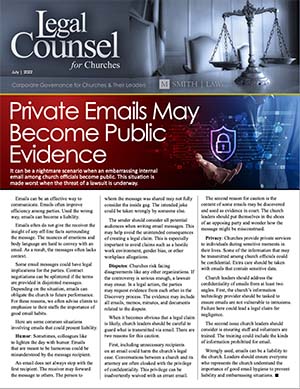It is not uncommon to see for-profit companies use a merger and acquisition (M&A) strategy to grow. These corporations believe combining their organizations with another can lead to greater profits and market share.
It might seem unusual to think about churches in the manner of M&A activity. While not typical, church leaders have a responsibility to consider all possible strategies to improve their corporate performance.
In the October 2019 edition of Legal Counsel for Churches, we explored the idea of church mergers. In this edition, we add acquisition to the church strategy toolkit.
Churches, like all institutions, have limited capabilities. The limitations can be with its resources, regulatory restrictions, management capabilities, or market pressures. The leaders of churches have
a fundamental decision to make. On one hand they can ignore market needs and opportunities. The other choice is to seek ways to expand their church’s powers.
Some companies try to build internal systems to fill in the missing pieces. Other firms make up for these deficiencies by acquiring companies that fill important gaps.
Here’s a couple of examples to help make this point. These are hypothetical situations to stir your imagination.
Church A Buys a Construction Company
Church A has a corporate strategy to help its members ease the burden of high utility bills. The church leaders recognize that members who have strained budgets are more subject to stress-related illnesses and less capable to be good financial stewards towards the church.
Church A decided to purchase a local construction company that would perform home improvement work for members of the community. The profits from the business are used for expansion and scaling the business. Some church members work part-time for the company for employment and skills development.
Church B Acquires a Grocery Store
Church B sees a need to help the community with affordable, healthy foods. Many of the church’s members reside in a food desert. Most of what’s available are fast foods restaurants. There has been a spike in high blood pressure, diabetes, and other health problems that exceed state averages. The Church sought a way to address these conditions and provide local employment.
Church B acquired a controlling interest in a grocery store that was in a saturated market and had declining market share. The good price the church negotiated led to sufficient resources to relocate the store to the community. The store sponsors healthy eating workshops and cooking classes for residents. The profits are reinvested in the store’s operations for further expansions.
These are examples of how a church may expand its influence in the community through an acquisition strategy. The first step is to think critically about the risk appetite of church leaders to explore a new model for revenue and community service. This conversation can lead to a tactical plan on how to benefit the church and community.
The next task is to be clear about what church leaders hope to accomplish. A goal to increase revenue for ministry can feel different from a focus on community service only. This exercise requires an explorative dialog to ensure all members of the leadership consent to the direction and purpose of a possible acquisition.
After church leaders agree on the strategy, the church governing board should conduct
a search of possible acquisition targets. A potential source for identifying available businesses is the services of a business broker. The broker will often have a list of business owners who are interested in selling a portion or 100% their companies.
Negotiating an acquisition can be a complicated transaction. There are many factors to consider. It would be advisable for church leaders to retain experienced consultants, attorneys, tax advisors, and accountants to help guide the conversation. Church leaders should be cautious with the monetary aspect, legal terms, and risks of buying a business.
Some acquisitions include all cash deals. Others involve bank lending or owner- financing. Church leaders should determine the deal size they are willing to entertain before considering a potential transaction.
A business acquisition can be a productive way for a church to increase its revenue and serve the community. Church leaders should approach this strategy carefully to ensure it achieves its expected results.

